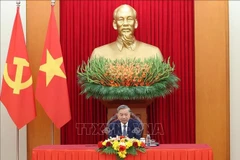President Triet stated this during a field trip on July 8 to the sitesplanned for the nuclear power station in Ninh Thuan province, where hewas briefed on the preparations. He found out about how human resourceswere developing and about the plans to build roads and electricity andwater supplies for the project.
After inspecting thesites, the State leader met with and presented gifts to local people inVinh Truong hamlet, Phuoc Dinh commune in Thuan Nam district andThai An hamlet, Vinh Hai commune in Ninh Hai district, where the powerstation’s two reactors will be built.
The Presidentapplauded the backing the local people and administration were giving tothe project, saying that their efforts will help to meet the country’sgrowing demand for power in general and the province in particular.
The construction will see traffic systems, schools andother facilities in the province being developed or upgraded, he added.
The President asked the Electricity of Vietnam (EVN)Group – the project’s investor – and the provincial authorities toresettle people who are being relocated quickly and effectively as wellas find them jobs.
Vietnam aims to completethe construction of the power station and start operating the firstreactor in 2020 and the second reactor a year later. Both reactors willhave a combined output of 4,000 MW.
According to the Ministry of Industry and Trade, the nation’s demand forpower will increase to 294 billion kWh in 2020 and will almost doublethat to 562 billion kWh by 2030.
More importantly, the supply of raw materialsfor the electricity industry is expected to be only enough to produce230 billion kWh by 2020 and 293 billion kWh by 2030./.
























